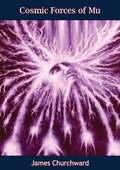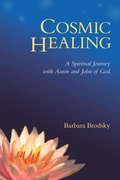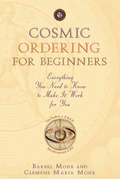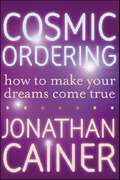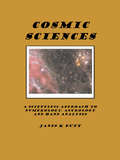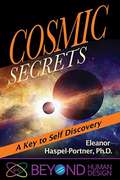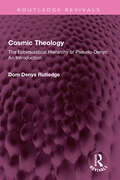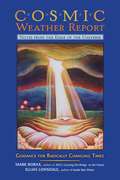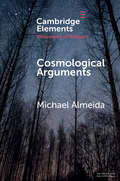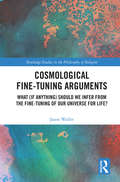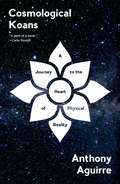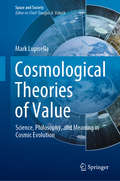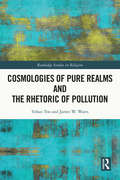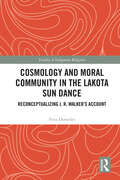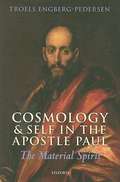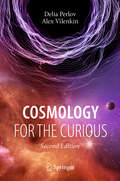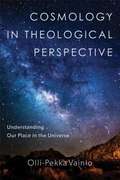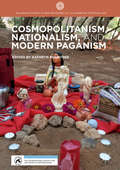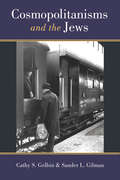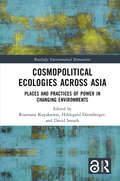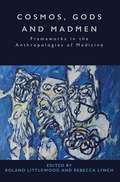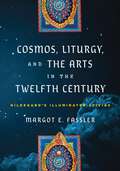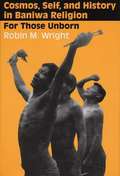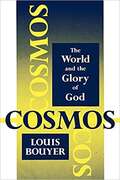- Table View
- List View
Cosmic Forces of Mu
by James ChurchwardAT THE time of my parting with the Rishi, after seven years of study under him, and when I thought I knew it all, he, placing his hand on my shoulder said:‘Go forth, my son, into nature’s schoolhouse and learn, for at present you know nothing except how to learn. Every old rock with its wrinkled and gnarled fact is speaking a tale of the past if you will but listen, e very leaf on tree or bush and every flower and blade of grass growing out of the ground, has a whisper for listening ears. Nature is the great schoolhouse of knowledge, from which man is taught. Nature is God speaking.’In my previous books I endeavored to show the high state attained by the Earth’s First Civilization, the state they had arrived at after 200,000 years of study and experience: and, how man then learnt his lessons from nature, a study which brought him into a closer touch with his Heavenly Father.I showed that his sciences were mere copies of nature. Even his geometry and geometrical figures were taken from flowers. He carried these flower symbols into his art so that, today, we find his ancient statuary and structures based on regular, progressive, geometrical lines. The same geometrical figures were used in explaining and teaching religion.In this work I have tried to show the ancient sciences in their grander and more sublime form, taking a step nearer to the Creator himself. Yet told in childlike simplicity, as was the custom of the ancients, unencumbered with technology and hard words to understand.—James Churchward
Cosmic Healing
by Barbara Brodsky<P>With the onset of sudden profound deafness at the age of 29, Barbara Brodsky set out on a quest to understand the nature of illness and healing, examining the interrelationship of mind and body and our capacity to transcend limitation. Asking the questions What is healing? Who and what heals? Why do some people heal while others do not? she discusses karma and free will, our habit of identifying with a limited sense of self, and our potential for greater healing. <P>A longtime Buddhist practitioner who began meditation in the '60s, Brodsky discovered a new path on her healing journey when she began channeling the spirit Aaron in 1989. Based on three decades of meticulously kept journals, Cosmic Healing weaves together Brodsky's Buddhist teachings, channeled material from Aaron, exercises for the reader, and an account of her experiences with the healer known as John of God (João Teixeira de Faria) at his teaching center, Casa de Dom Inácio, in Brazil. While Cosmic Healing is channeled in part and has deep roots in traditional dharma, it is at heart a universal story of human growth and discovery. Old beliefs limit us every day. But as Brodsky discovered and teaches, we can learn to recognize such limiting beliefs, transcend them, and live a deeper truth.
Cosmic Ordering for Beginners: Everything You Need To Know To Make It Work For You
by Barbel Mohr Clemens MohrThe phenomenon of Cosmic Ordering is changing thousands of lives. If you’re still waiting for the right job, partner, or house, or for that million-dollar lottery win, then why not try to make your wishes come true with the only book you’ll need to really understand how to cosmically order what you want. . . .This fascinating and practical entry-level book from Barbel Mohr and Clemens Maria Mohr outlines the key ideas and principles that govern the cosmos, and ways of changing your subconscious to positively shape your life. Tune in to the Universe, and order all those things that you truly desire. From the very basics of listening to your inner voice and writing down what you want to wish for, to collectively wishing with others—this is the essential beginners’ guide to this worldwide phenomenon. Written in a lively, energetic style with plenty of fantastic hints, tips, and techniques, Cosmic Ordering for Beginners also includes an exclusive free CD, where Barbel relates the very best meditations and exercises to help make your dreams a reality.
Cosmic Ordering: How to Make Your Dreams Come True
by Jonathan CainerCosmic Ordering is about wishing, about asking, and about making the impossible, possible. You can fill your life with more of what you want—and less of what you don’t. However big or small, your wishes are attainable. But how do you know what you really want? From order to delivery, Jonathan Cainer, the internationally famous astrologer for the The Daily Mail, will lead you through all the steps of the creed that has become a worldwide phenomenon.Learn how to decide what you really want, announce to the universe your intention to get it, and get it delivered. Call on the cosmos to change your life and realize your dreams with Cosmic Ordering!
Cosmic Sciences: A Scientific Approach to Numerology, Astrology & Hand Analysis
by Janis K. ButtThis is a basic textbook about Pythagorean Numerology, Astrology and Hand Analysis. All three disciplines are cosmic in nature. In Numerology, each number is associated with a certain vibrational energy and in the case of Astrology and Hand Analysis, their link to the universe is through the Zodiac and the planets. Section 1 on Numerology provides a full analysis of both birth dates and birth names. Section 2 on Astrology gives a broad overview of natal Astrology, and also chapters on Spiritual and Oriental Astrology. These two sections have numerous examples of famous persons. Section 3 on modern Hand Analysis (technically known as Chirology) traces the development of the subject and its adoption by the forensic sciences as well as its role in medical science. The book reveals through illustrations of the hand our personal characteristics and potential, and concludes with advice on interpreting hands. Section 4 shows in tabular form how the three subjects together can help us.
Cosmic Secrets: A Key To Self Discovery
by Eleanor Haspel-PortnerConsciousness is a state of being that we often take for granted. But true consciousness—and all the multidimensionality that comes with it—is the key to unlocking a deeper and more meaningful relationship with our own personalities. Here to guide the way is author Eleanor Haspel-Portner, PhD, whose groundbreaking study—encompassed for the first time in Cosmic Secrets—is the only scientifically documented work on the Human Design System. Discover the system's basics, its theoretical groundwork, and how to apply that knowledge to its five different personality types. Once you discover which type you are, you'll learn concrete ways to optimize your personality and live your most authentic and successful life. Sharing her own personal journey of discovery, Haspel-Portner helps readers develop a more profound understanding of their personalities and how the endless facets of consciousness affect them daily. A stunning blend that encompasses the study of chakras, astrology, Human Design, the tree of life, developmental psychology, and I Ching, Cosmic Secrets urges you to go beyond basic psychology and dig into the true nature of self-growth.
Cosmic Theology: The Ecclesiastical Hierarchy of Pseudo-Denys: An Introduction (Routledge Revivals)
by Dom Denys RutledgeFirst published in 1964, Cosmic Theology introduces a work, little known to English readers, which has influenced theological and mystical writing for at least fourteen hundred years. It is, in effect, a synthesis of Christian teaching, particularly on the nature of the Church, in which science and religion, the other world and the values of the present world may be seen in their source and original harmony. Written before the division between Greek and Latin Churches, and later between Catholic and Protestant, it affords a convenient point from which to view later speculation and controversy in its true perspectives. Apart from helping those interested in the ecumenical movement and in the current liturgical revival, this work will serve as a bridge to the understanding of Eastern, and particularly Hindu, religion.
Cosmic Weather Report: Notes from the Edge of the Universe
by Mark Borax Ellias LonsdaleOn a planet facing environmental and geopolitical catastrophes on every continent, the idea that human beings need to “evolve or die” is gaining currency on an almost daily basis. Cosmic Weather Reporttackles the personal and collective obstacles to world transformation head-on, inspiring readers to rethink the whole purpose of humankind, and change their lives-and the course of the planet’s future-from within. In this book, eminent astrologers Mark Borax and Ellias Lonsdale pool their talents to explore what we are emerging from-“the age we need to leave behind”-and what we are approaching-“the age we’re on the verge of creating. ” Readers are encouraged to see how the greatest difficulties can be seized for optimal growth. WhileCosmic Weather Reportis not an astrology book per se, it uses astrological concepts, which can also be read as metaphors to convey the universal scale of the transformations taking place. Preserving the lecture format and question-and-answer dialogue of Lonsdale and Borax’s famed mystery school, the authors usher readers into an exciting classroom of evolution in which students get to quiz the teachers.
Cosmological Arguments (Elements in the Philosophy of Religion)
by Michael AlmeidaThe book discusses the structure, content, and evaluation of cosmological arguments. The introductory chapter investigates features essential to cosmological arguments. Traditionally, cosmological arguments are distinguished by their appeal to change, causation, contingency or objective becoming in the world. But none of these is in fact essential to the formulation of cosmological arguments. Chapters 1-3 present a critical discussion of traditional Thomistic, Kalam, and Leibnizian cosmological arguments, noting various advantages and disadvantages of these approaches. Chapter 4 offers an entirely new approach to the cosmological argument - the approach of theistic modal realism. The proper explananda of cosmological arguments on this approach is not change, causation, contingency or objective becoming in the world. The proper explananda is the totality of metaphysical reality - all actualia and all possibilia. The result is the most compelling and least objectionable version of the cosmological argument.
Cosmological Fine-Tuning Arguments: What (if Anything) Should We Infer from the Fine-Tuning of Our Universe for Life? (Routledge Studies in the Philosophy of Religion)
by Jason WallerIf the physical constants, initial conditions, or laws of nature in our universe had been even slightly different, then the evolution of life would have been impossible. This observation has led many philosophers and scientists to ask the natural next question: why is our universe so "fine-tuned" for life? The debates around this question are wide-ranging, multi-disciplinary, complicated, technical, and (at times) heated. This study is a comprehensive investigation of these debates and the many metaphysical and epistemological questions raised by cosmological fine-tuning. Waller’s study reaches two significant and controversial conclusions. First, he concludes that the criticisms directed at the "multiverse hypothesis" by theists and at the "theistic hypothesis" by naturalists are largely unsuccessful. Neither of these options can plausibly be excluded. Choosing between them seems to turn on primitive (and so hard to justify) metaphysical intuitions. Second, in order to break the philosophical deadlock, Waller moves the debate from the level of universes to the level of possible worlds. Arguing that possible worlds are also "fine-tuned" in an important and interesting sense, Waller concludes that the only plausible explanation for the fine-tuning of the actual world is to posit the existence of some kind of "God-like-thing."
Cosmological Koans: A Journey To The Heart Of Physical Reality
by Anthony AguirreCosmological Koans invites the reader into an intellectual adventure of the highest order. Through more than fifty Koans—pleasingly paradoxical vignettes following the ancient Zen tradition—leading physicist Anthony Aguirre takes the reader across the world from West to East, and through ideas spanning the age, breadth, and depth of the Universe. Using these beguiling Koans (Could there be a civilization on a mote of dust? How much of your fate have you made? Who cleans the universe?) and a flair for explaining complex science, Aguirre covers cosmic questions that scientific giants from Aristotle to Galileo to Heisenberg have grappled with, from the meaning of quantum theory and the nature of time to the origin of multiple universes. A playful and enlightening book, Cosmological Koans explores the strange hinterland between the deep structure of the physical world and our personal experience of it, giving readers what Einstein himself called “the most beautiful and deepest experience” anyone can have: a sense of the mysterious.
Cosmological Theories of Value: Science, Philosophy, and Meaning in Cosmic Evolution (Space and Society)
by Mark LupisellaBuilding from foundations of modern science and cosmic evolution, as well as psychological and philosophical perspectives of value and meaning, this book explores some of humanity’s biggest questions: · Is the Universe “about something”? · What might be roles for life and intelligence in cosmic evolution? · How might we think about value, meaning, purpose, and ethics in a cosmic evolutionary context? The author explores how the sciences of relativity and quantum theory, combined with cosmic evolution and philosophical traditions such as process philosophy, contribute to the development of a broad “relationalist framework”. That framework helps inform perspectives such as “scientific minimalism” and “cosmological theories of value”. Cosmological Reverence, Cosmocultural Evolution, and the Connection-Action Principle are explored as examples of cosmological theories of value, all of which help inform how we might think about ethics, value, and meaning in a cosmic context – including application to the search for extraterrestrial life and the future of intelligence in the universe. This book will benefit a diverse range of practitioners in philosophy, science, and policy, including interdisciplinary fields such as Science and Society and cultural evolution studies. From the Foreword: “This volume ranges from the sciences of cosmic evolution, relativity, and quantum mechanics, to value theory and process philosophy, all with the goal of exploring how they relate to humanity in the sense of worldviews and meaning. With his three cosmological theories of value, Lupisella goes beyond the bounds of most books on naturalism, and into fundamental questions about the nature of the universe and our relation to it. To read Lupisella is to have a mind-boggling experience, to want to race to references, to want to know more.” Steven J. Dick Former Baruch S. Blumberg NASA/ Library of Congress Chair in Astrobiology Former NASA Chief Historian
Cosmologies of Pure Realms and the Rhetoric of Pollution (Routledge Studies in Religion)
by James W. Watts Yohan YooThis collaboration between two scholars from different fields of religious studies draws on three comparative data sets to develop a new theory of purity and pollution in religion, arguing that a culture’s beliefs about cosmological realms shapes its pollution ideas and its purification practices. The authors of this study refine Mary Douglas’ foundational theory of pollution as "matter out of place," using a comparative approach to make the case that a culture’s cosmology designates which materials in which places constitute pollution. By bringing together a historical comparison of Ancient Near Eastern and Mediterranean religions, an ethnographic study of indigenous shamanism on Jeju Island, Korea, and the reception history of biblical rhetoric about pollution in Jewish and Christian cultures, the authors show that a cosmological account of purity works effectively across multiple disparate religious and cultural contexts. They conclude that cosmologies reinforce fears of pollution, and also that embodied experiences of purification help generate cosmological ideas. Providing an innovative insight into a key topic of ritual studies, this book will be of vital interest to scholars and graduate students in religion, biblical studies, and anthropology.
Cosmology and Moral Community in the Lakota Sun Dance: Reconceptualizing J. R. Walker's Account (Vitality of Indigenous Religions)
by Fritz DetwilerDrawing on Indigenous methodologies, this book uses a close analysis of James R. Walker’s 1917 monograph on the Lakota Sun Dance to explore how the Sun Dance communal ritual complex – the most important Lakota ceremony – creates moral community, providing insights into the cosmology and worldview of Lakota tradition. The book uses Walker’s primary source to conduct a reading of the Sun Dance in its nineteenth-century context through the lenses of Lakota metaphysics, cosmology, ontology, and ethics. The author argues that the Sun Dance constitutes a cosmic ethical drama in which persons of all types – human and nonhuman – come together in reciprocal actions and relationships. Drawing on contemporary animist theory and a perspectivist approach that uses Lakota worldview assumptions as the basis for analysis, the book enables a richer understanding of the Sun Dance and its role in the Lakota moral world. Offering a nuanced understanding that centers Lakota views of the sacred, this book will be relevant to scholars of religion and animism, and all those interested in Native American cultures and lifeways.
Cosmology and Self in the Apostle Paul: The Material Spirit
by Troels Engberg-PedersenThis book attempts to synthesize what can be known of Paul's overall world-view, not least to be understood in concrete, cosmological terms, and to connect his world-view with his notion of self as this emerges in his accounts of his own conversion.
Cosmology for the Curious
by Delia Perlov Alex VilenkinThis book is a gentle introduction for all those wishing to learn about modern views of the cosmos. Our universe originated in a great explosion – the big bang. For nearly a century cosmologists have studied the aftermath of this explosion: how the universe expanded and cooled down, and how galaxies were gradually assembled by gravity. The nature of the bang itself has come into focus only relatively recently. It is the subject of the theory of cosmic inflation, which was developed in the last few decades and has led to a radically new global view of the universe. Students and other interested readers will find here a non-technical but conceptually rigorous account of modern cosmological ideas - describing what we know, and how we know it. One of the book's central themes is the scientific quest to find answers to the ultimate cosmic questions: Is the universe finite or infinite? Has it existed forever? If not, when and how did it come into being? Will it ever end? The book is based on the undergraduate course taught by Alex Vilenkin at Tufts University. It assumes no prior knowledge of physics or mathematics beyond elementary high school math. The necessary physics background is introduced as it is required. Each chapter includes a list of questions and exercises of varying degree of difficulty. This new edition includes hints for answering the questions and exercises, as well as extensions to the discussions on dark matter, quantum cosmology. A new chapter summarizing the standard cosmological model has also been added.
Cosmology in Theological Perspective: Understanding Our Place in the Universe
by Olli-Pekka VainioOlli-Pekka Vainio, a leading expert in science and theology, explores questions concerning the place and significance of humans in the cosmos. Vainio introduces cosmology from a "state of the question" perspective, examining the history of the idea in dialogue with C. S. Lewis. This work, which is related to a NASA-funded project on astrobiology, ties into the ongoing debate on the relationship between Christian theism and scientific worldview and shows what the stakes are for religion and theology in the rise of modern science.
Cosmopolitanism, Nationalism, and Modern Paganism (Palgrave Studies in New Religions and Alternative Spiritualities)
by Kathryn RountreeThis volume explores how Pagans negotiate local and global tensions as they craft their identities, both as members of local communities and as cosmopolitan "citizens of the world. " Based on cutting edge international case studies from Pagan communities in the United States, Poland, Russia, Ukraine, Israel, South Africa, Australia, New Zealand, and Malta, it considers how modern Pagans negotiate tensions between the particular and universal, nationalism and cosmopolitanism, ethnicity, and world citizenship. The burgeoning of modern Paganisms in recent decades has proceeded alongside growing globalization and human mobility, ubiquitous Internet use, a mounting environmental crisis, the re-valuing of indigenous religions, and new political configurations. Cosmopolitanism and nationalism have both influenced the weaving of unique local Paganisms in diverse contexts. Pagans articulate a strong attachment to local or indigenous traditions and landscapes, constructing paths that reflect local socio-cultural, political, and historical realities. However, they draw on the Internet and the global circulation of people and universal ideas. This collection considers how they confound these binaries in fascinating, complex ways as members of local communities and global networks.
Cosmopolitanisms and the Jews
by Cathy Gelbin Sander GilmanCosmopolitanisms and the Jews adds significantly to contemporary scholarship on cosmopolitanism by making the experience of Jews central to the discussion, as it traces the evolution of Jewish cosmopolitanism over the last two centuries. The book sets out from an exploration of the nature and cultural-political implications of the shifting perceptions of Jewish mobility and fluidity around 1800, when modern cosmopolitanist discourse arose. Through a series of case studies, the authors analyze the historical and discursive junctures that mark the central paradigm shifts in the Jewish self-image, from the Wandering Jew to the rootless parasite, the cosmopolitan, and the socialist internationalist. Chapters analyze the tensions and dualisms in the constructed relationship between cosmopolitanism and the Jews at particular historical junctures between 1800 and the present, and probe into the relationship between earlier anti-Semitic discourses on Jewish cosmopolitanism and Stalinist rhetoric.
Cosmopolitical Ecologies Across Asia: Places and Practices of Power in Changing Environments (ISSN)
by David Sneath Hildegard Diemberger Riamsara KuyakanonCosmopolitical Ecologies Across Asia offers a unique insight into the non-human and spiritual dimensions of environmental management in a changing world.This volume presents a comparative, place-based exploration of landscapes across Asia and the entities, practices and knowledges that inhabit them. Rather than treating sacred mountains, terrains and water sources as self-contained, esoteric religious phenomena, the authors consider them within critical 'cosmopolitical ecologies' framings in which non-human entities are engaged as actors in the socio-political arena. The chapters include case studies of healing springs recognized by governments, and sacred mountains that are addressed by heads of states and Communist Party cadres, or that speak to the faithful through spirit mediums in a politics of re-enchantment. Contributors explore the diverse ways in which non-human entities such as forest spirits, reindeer, mountains and Buddhist Masters of the Land are engaged by humans to navigate environmental change and address a range of ecological threats from large-scale mining to climate change. Cosmopolitical ecologies approaches encompass the healing power of topography as well as transformative intimacies with other-than-human beings such as sparrows within an Islamic eco-theological poetic setting. In this light the book observes dynamic and creative processes of cosmological innovation including the repurposing of ritual to address challenges such as the Covid-19 epidemic.This book will be of great interest to students and scholars of environment and society across disciplinary perspectives in general, and to anthropologists, human geographers, political ecologists, indigenous studies, area studies, environmental sciences and environmental humanities scholars in particular.The Introduction to this book is freely available as a downloadable Open Access PDF at http://www.taylorfrancis.com under a Creative Commons Attribution-Non Commercial-No Derivatives (CC-BY-NC-ND) 4.0 license.
Cosmopolitical Ecologies Across Asia: Places and Practices of Power in Changing Environments (Routledge Environmental Humanities)
by Riamsara KuyakanonCosmopolitical Ecologies Across Asia offers a unique insight into the non-human and spiritual dimensions of environmental management in a changing world. This volume presents a comparative, place-based exploration of landscapes across Asia and the entities, practices and knowledges that inhabit them. Rather than treating sacred mountains, terrains and water sources as self-contained, esoteric religious phenomena, the authors consider them within critical 'cosmopolitical ecologies' framings in which non-human entities are engaged as actors in the socio-political arena. The chapters include case studies of healing springs recognized by governments, and sacred mountains that are addressed by heads of states and Communist Party cadres, or that speak to the faithful through spirit mediums in a politics of re-enchantment. Contributors explore the diverse ways in which non-human entities such as forest spirits, reindeer, mountains and Buddhist Masters of the Land are engaged by humans to navigate environmental change and address a range of ecological threats from large-scale mining to climate change. Cosmopolitical ecologies approaches encompass the healing power of topography as well as transformative intimacies with other-than-human beings such as sparrows within an Islamic eco-theological poetic setting. In this light the book observes dynamic and creative processes of cosmological innovation including the repurposing of ritual to address challenges such as the Covid-19 epidemic. This book will be of great interest to students and scholars of environment and society across disciplinary perspectives in general, and to anthropologists, human geographers, political ecologists, indigenous studies, area studies, environmental sciences and environmental humanities scholars in particular.
Cosmos, Gods and Madmen: Frameworks in the Anthropologies of Medicine
by Lynch LittlewoodThe social anthropology of sickness and health has always been concerned with religious cosmologies: how societies make sense of such issues as prediction and control of misfortune and fate; the malevolence of others; the benevolence (or otherwise) of the mystical world; local understanding and explanations of the natural and ultra-human worlds. This volume presents differing categorizations and conflicts that occur as people seek to make sense of suffering and their experiences. Cosmologies, whether incorporating the divine or as purely secular, lead us to interpret human action and the human constitution, its ills and its healing and, in particular, ways which determine and limit our very possibilities.
Cosmos, Liturgy, and the Arts in the Twelfth Century: Hildegard's Illuminated "Scivias" (The Middle Ages Series)
by Margot E. FasslerIn Cosmos, Liturgy, and the Arts in the Twelfth Century, Margot E. Fassler takes readers into the rich, complex world of Hildegard of Bingen’s Scivias (meaning “Know the ways”) to explore how medieval thinkers understood and imagined the universe. Hildegard, renowned for her contributions to theology, music, literature, and art, developed unique methods for integrating these forms of thought and expression into a complete vision of the cosmos and of the human journey. Scivias was Hildegard’s first major theological work and the only one of her writings that was both illuminated and copied by scribes from her monastery during her lifetime. It contains not just religious visions and theological commentary, but also a shortened version of Hildegard’s play Ordo virtutum (“Play of the virtues”), plus the texts of fourteen musical compositions.These elements of Scivias, Fassler contends, form a coherent whole demonstrating how Hildegard used theology and the liturgical arts to lead and to teach the nuns of her community. Hildegard’s visual and sonic images unfold slowly and deliberately, opening up varied paths of knowing. Hildegard and her nuns adapted forms of singing that they believed to be crucial to the reform of the Church in their day and central to the ongoing turning of the heavens and to the nature of time itself. Hildegard’s vision of the universe is a “Cosmic Egg,” as described in Scivias, filled with strife and striving, and at its center unfolds the epic drama of every human soul, embodied through sound and singing. Though Hildegard’s view of the cosmos is far removed from modern understanding, Fassler’s analysis reveals how this dynamic cosmological framework from the Middle Ages resonates with contemporary thinking in surprising ways, and underscores the vitality of the arts as embodied modes of theological expression and knowledge.
Cosmos, Self, and History in Baniwa Religion: For Those Unborn
by Wright Robin M.In this ethnography of Baniwa religion, Robin M. Wright explores the myths of creation and how they have been embodied in religious movements and social action—particularly in a widespread conversion to evangelical Christianity. He opens with a discussion of cosmogony, cosmology, and shamanism, and then goes on to explain how Baniwa origin myths have played an active role in shaping both personal and community identity and history. He also explores the concepts of death and eschatology and shows how the mythology of destruction and renewal in Baniwa religion has made the Baniwa people receptive to both Catholic and Protestant missionaries.
Cosmos: The World and the Glory of God
by Louis BouyerLouis Bouyer, one of the 20th century giants of Catholic theology, here addresses a breathtaking range of questions related to the world: the history of origin studies, from cosmogonic myth to philosophical cosmologies, from magic to mysticism. Science, myth, philosophy, theology, poetic experience and technology here constantly rub elbows. Through it all he explores the insightfulness of Christian revelation penetrating the mystery, as a reflection of the mystery of that other cosmos it reflects; the inner being of God, the creator. <p><p> Louis Bouyer is a priest, theologian, teacher and writer.
